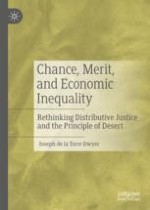2020 | OriginalPaper | Chapter
4. Equal Opportunity and Just Deserts: Better Late than Before
Author : Joseph de la Torre Dwyer
Published in: Chance, Merit, and Economic Inequality
Publisher: Springer International Publishing
Activate our intelligent search to find suitable subject content or patents.
Select sections of text to find matching patents with Artificial Intelligence. powered by
Select sections of text to find additional relevant content using AI-assisted search. powered by
